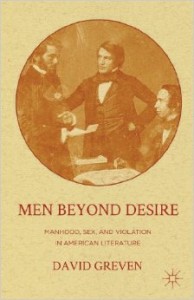 Men Beyond Desire: Manhood, Sex, and Violation in American Literature
Men Beyond Desire: Manhood, Sex, and Violation in American Literature
by David Greven
Palgrave Macmillan. 294 pages, $65.
ANDREW JACKSON captured the White House in 1828 by turning himself into a symbol of American manhood, a tough backwoodsman who dressed, spoke, and acted the part. David Greven believes that Jackson’s construction of manhood—white male power rejecting any hint of weakness and willing to use violence—has prevailed in American culture to this day. Certainly the example of our current president, whose political persona is based almost entirely on simplistic images of manliness, supports Greven’s belief. Jackson’s masculine performance included killing a man in a duel and winning the Battle of New Orleans, whereas George W. Bush’s must rely on staged events, which suggests that this construction is losing its authenticity if not its appeal.
But as David Greven’s new book Men Beyond Desire makes clear, American manhood is more complex than blue jeans and swagger. The author, a professor of English at Connecticut College, argues that central characters in some of the most familiar works of American literature reject normative sexual roles, especially constructions of manhood. Greven posits that the classic texts of our literature are full of transgressive ideas that run counter to concepts that dominate other spheres of American life. Greven is not arguing that these characters are necessarily gay or lesbian, although that is likely in some cases. Almost fifty years ago, in Love and Death in the American Novel, Leslie Fiedler stirred up the world of literary criticism by asserting that the strongest emotional bonds in The Adventures of Huckleberry Finn and James Fenimore Cooper’s Leatherstocking Tales existed between two men of different races. This opened the door to readings that acknowledged the existence of homoerotic elements in our literature. Today, gender studies scholars like Greven have moved beyond the once shocking suggestion that Huck and Jim were lovers to more nuanced readings. Digging deep into the historical and social context in which his authors wrote, Greven explores how two powerful antebellum movements, the cult of the self-made man and campaigns for sexual and hygienic reform, influenced concepts of healthy and unhealthy manhood as reflected in works by Washington Irving, Nathaniel Hawthorne, Edgar Allan Poe, James Fenimore Cooper, Harriet Beecher Stowe, and Herman Melville. The gist of Greven’s argument is that in pre-Civil War America men were confronted with two social imperatives: compulsory homosociability and heteronormativity. These technical terms mean that until reaching a certain age men were expected to enjoy spending time exclusively in the company of other men, whether in fraternities, in taverns, in the woods, or at sea. Then, with little or no knowledge of “the other,” of women, they were then expected to enter a heterosexual marriage. Greven demonstrates that in work after work our greatest 19th-century writers created characters who reject both of these imperatives. As his title indicates, they created men “beyond desire,” men who are not interested in friendship with other men or in sexual union with women. What’s more, these characters are often men of great physical beauty, which makes them objects of desire for both men and women. One of Greven’s many brilliant insights is that these authors occasionally managed to create situations in which women could express a desire for men, something truly transgressive in 19th-century America. Because they lack desire and do not wish to be desired, these male characters “overturn assumptions” and “refuse to be encased in the normative sexual ‘truths’” of their time. The price of this defiance is usually death. The beautiful young man becomes sick and dies or, in the cases of Uncle Tom and Billy Budd, suffers a violent end. Greven never adequately explains what motivates these inviolate males. This is the book’s only weakness. Given their prevalence in antebellum literature, it is natural for the reader to wonder why these men behave as they do. Men Beyond Desire is dense with ideas and wide-ranging in its use of sources, but Greven keeps his eye on the book’s central thesis and avoids using academic jargon, which will make it comprehensible to lay readers. The chapter on Uncle Tom’s Cabin, a strange novel that has held the American imagination since its initial publication, is masterful: Greven redeems the book from the charge of sentimentality and boldly explores the homoerotically tinged nature of slavery. I fell in love with American literature when I read The Scarlet Letter at an early age. It was a naïve love. Although I would gladly return to the simple wonder of reading a good story that I felt when first encountering these texts, that is impossible. As a mature reader, I am grateful to have a critic like David Greven as a guide to the very serious ideas about gender roles contained in our national literature, and the sometimes frightening implications that these ideas continue to hold for all of us. Daniel Burr is an assistant dean at the Univ. of Cincinnati College of Medicine, where he also teaches courses on literature and medicine.
____________________________________________________________________




